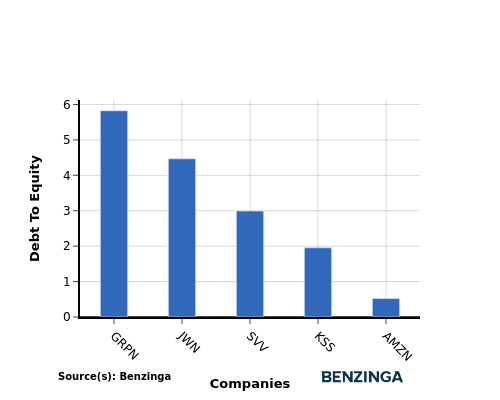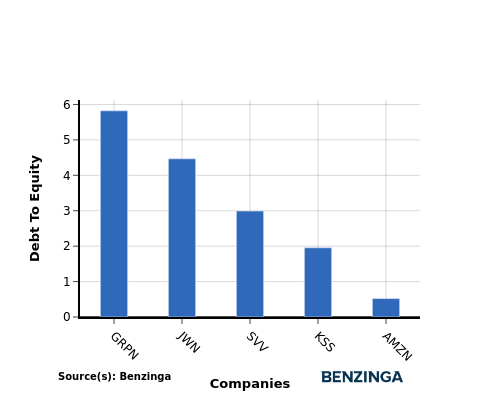In the ever-evolving and intensely competitive business landscape, conducting a thorough company analysis is of utmost importance for investors and industry followers. In this article, we will carry out an in-depth industry comparison, assessing Amazon.com AMZN alongside its primary competitors in the Broadline Retail industry. By meticulously examining key financial metrics, market positioning, and growth prospects, we aim to offer valuable insights to investors and shed light on company's performance within the industry.
Amazon.com Background
Amazon is the leading online retailer and marketplace for third party sellers. Retail related revenue represents approximately 75% of total, followed by Amazon Web Services' cloud computing, storage, database, and other offerings (15%), advertising services (5% to 10%), and other the remainder. International segments constitute 25% to 30% of Amazon's non-AWS sales, led by Germany, the United Kingdom, and Japan.
| Company | P/E | P/B | P/S | ROE | EBITDA (in billions) | Gross Profit (in billions) | Revenue Growth |
|---|---|---|---|---|---|---|---|
| Amazon.com Inc | 43.35 | 8.23 | 3.49 | 6.19% | $32.08 | $31.0 | 11.04% |
| Alibaba Group Holding Ltd | 17.85 | 1.57 | 1.62 | 4.64% | $54.02 | $92.47 | 5.21% |
| PDD Holdings Inc | 12.55 | 4.61 | 3.63 | 13.54% | $37.97 | $63.36 | 85.65% |
| MercadoLibre Inc | 68.51 | 24.47 | 5.35 | 10.37% | $0.72 | $2.44 | 35.27% |
| JD.com Inc | 11.31 | 1.61 | 0.35 | 5.22% | $15.92 | $45.04 | 5.12% |
| Coupang Inc | 42.14 | 10.29 | 1.49 | 1.74% | $0.28 | $2.27 | 27.2% |
| eBay Inc | 15.32 | 5.38 | 3.02 | 11.59% | $0.95 | $1.85 | 3.04% |
| Vipshop Holdings Ltd | 6.45 | 1.34 | 0.48 | 2.76% | $1.47 | $4.96 | -9.18% |
| Dillard's Inc | 10.81 | 3.39 | 1.01 | 6.37% | $0.15 | $0.58 | -4.19% |
| MINISO Group Holding Ltd | 17.80 | 4.13 | 2.90 | 6.26% | $0.79 | $1.77 | 24.08% |
| Ollie's Bargain Outlet Holdings Inc | 26.70 | 3.38 | 2.44 | 3.14% | $0.08 | $0.22 | 12.41% |
| Macy's Inc | 22.40 | 0.94 | 0.17 | 3.53% | $0.44 | $2.16 | -3.48% |
| Nordstrom Inc | 12.86 | 3.85 | 0.25 | 13.68% | $0.4 | $1.49 | 3.23% |
| Kohl's Corp | 6.40 | 0.47 | 0.11 | 1.73% | $0.35 | $1.6 | -4.18% |
| Savers Value Village Inc | 18.67 | 3.17 | 0.94 | 5.09% | $0.07 | $0.22 | 0.53% |
| Groupon Inc | 12.32 | 8.45 | 0.63 | 34.72% | $0.03 | $0.1 | -9.48% |
| Average | 20.14 | 5.14 | 1.63 | 8.29% | $7.58 | $14.7 | 11.42% |
Through a thorough examination of Amazon.com, we can discern the following trends:
-
The current Price to Earnings ratio of 43.35 is 2.15x higher than the industry average, indicating the stock is priced at a premium level according to the market sentiment.
-
The elevated Price to Book ratio of 8.23 relative to the industry average by 1.6x suggests company might be overvalued based on its book value.
-
With a relatively high Price to Sales ratio of 3.49, which is 2.14x the industry average, the stock might be considered overvalued based on sales performance.
-
With a Return on Equity (ROE) of 6.19% that is 2.1% below the industry average, it appears that the company exhibits potential inefficiency in utilizing equity to generate profits.
-
With higher Earnings Before Interest, Taxes, Depreciation, and Amortization (EBITDA) of $32.08 Billion, which is 4.23x above the industry average, the company demonstrates stronger profitability and robust cash flow generation.
-
The gross profit of $31.0 Billion is 2.11x above that of its industry, highlighting stronger profitability and higher earnings from its core operations.
-
The company's revenue growth of 11.04% is significantly lower compared to the industry average of 11.42%. This indicates a potential fall in the company's sales performance.
Debt To Equity Ratio

The debt-to-equity (D/E) ratio is a key indicator of a company's financial health and its reliance on debt financing.
Considering the debt-to-equity ratio in industry comparisons allows for a concise evaluation of a company's financial health and risk profile, aiding in informed decision-making.
In terms of the Debt-to-Equity ratio, Amazon.com can be assessed by comparing it to its top 4 peers, resulting in the following observations:
-
Among its top 4 peers, Amazon.com has a stronger financial position with a lower debt-to-equity ratio of 0.52.
-
This indicates that the company relies less on debt financing and maintains a more favorable balance between debt and equity, which can be viewed positively by investors.
Key Takeaways
For Amazon.com, the PE, PB, and PS ratios are all high compared to its peers in the Broadline Retail industry, indicating that the stock may be overvalued. The low ROE suggests that Amazon.com is not generating significant returns on shareholder equity. However, the high EBITDA and gross profit margins show strong operational performance. The low revenue growth rate may be a concern for Amazon.com compared to its industry peers.
This article was generated by Benzinga's automated content engine and reviewed by an editor.
© 2024 Benzinga.com. Benzinga does not provide investment advice. All rights reserved.








